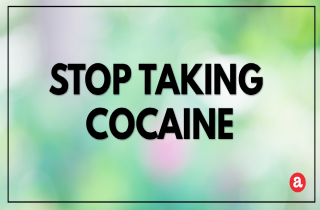Are you ready to face a cocaine habit?
Many people do not realize that cocaine is a highly addictive drug that directly targets the central nervous system. Cocaine’s addiction liability is one of the reasons that it has been scheduled as a narcotic, illegal drug in the U.S. And people who use cocaine frequently are at seriously high risk of physical and psychological dependence.
So, how do you stop using cocaine? Can you just quit on your own? What happens once you stop taking cocaine? Find out what to expect after you stop a cocaine habit and how to safely do so here. Then, we invite your questions and comments about quitting cocaine at the end.
Can I just stop taking cocaine?
It depends.
In general, it is advisable to consult a medical professional before quitting cocaine. There are many factors involved when deciding on a course for cessation, the major one being your level of dependence and/or addiction. If you are highly addicted to cocaine, the answer to this question would be, “No,” as severe cravings are very likely to occur. Heavy users find it difficult to just stop, as they battle the strong urge to use to relieve the symptoms.
If you are an occasional user, it might be more likely that you can just stop taking cocaine, however, keep in mind that you will need to modify behaviors and be aware of triggers in order to avoid future use. So how should you get off cocaine? Let’s first explore what happens in the brain and body after you quit using cocaine.
What happens when you stop taking cocaine?
If you’ve been taking cocaine for a longer period of time, chances are that your body has gotten used to its presence and will protest when you stop. Why? Cocaine works on the brain as a stimulant and causes the body to over-produce depressant effects in order to balance out. So once you stop using cocaine, these effects become noticeable. And when cocaine is no longer in the system, the central nervous system’s adapted functions only gradually normalize over time.
During the period when cocaine starts to exit the body – also known as withdrawal – you can expect to experience a set of symptoms commonly referred to a withdrawal symptoms. After a period of regular use, the body needs time to “figure out” how to regain homeostasis. So, when you stop taking cocaine… symptoms follow.
Side effects when you stop taking cocaine
Getting off cocaine is a good thing, a great decision!, but it comes with a set of adverse side effects. The common side effects that occur when you quit taking cocaine can include:
- depression
- disturbed sleeping
- fatigue
- feeling agitated
- increased appetite
- slowing down of activity
Even though the effects are not physically tormenting, they should not be underestimated since they can still cause cravings and provoke relapse. This is why experts strongly recommended you consider emotional-psychological support during the first week or so of quitting cocaine until the side effects wear off.
Stop taking cocaine suddenly
Suddenly stopping cocaine is certainly not pleasant for your body or mental health. In fact, this method can increase the likelihood of relapse, as side effects can be more severe and intense. Instead, get your body physically and mentally ready to cope with the absence of cocaine by means of slowly tappering down your dose. However, there are some cases when quitting cocaine cold turkey may be best.
Stop taking cocaine cold turkey
Heavy users may want to consider a cold turkey cocaine detox if there are not other viable options available for a controlled taper. However, going cold turkey off cocaine can provoke the so-called “crash period,” which is manifested by accompanied by a strong craving for more cocaine. When severe cravings occur, people often reach for other abusive substances or can even consider extreme ideas like suicide. This is why medical supervision is crucial during cocaine detox.
How do I stop taking cocaine?
Consult a medical professional such as a medical doctor, psychiatrist, or an addiction therapist (licensed psychologist) before you try to quit cocaine. While it is possible to quit without professional assistance, doing it on your own isn’t recommended, as it can be dangerous due to unstable mental health issues. A doctor can determine if a treatment facility may be best for you, or not, and will advise you on how to address withdrawal symptoms and be most comfortable during the process.
How to stop taking cocaine safely
Simply, the best way to stop taking cocaine safely is to seek medical assistance. Medical and mental health professionals can help you determine what is the safest way for your individual case, as all cases are unique and depend on a number of factors such as:
- age
- co-occuring disorders
- general health
- gender
- medical history
- level of dependence
If you are determined to quit cocaine on your own, stay surrounded by close and positive people. And seek help though support groups, psychotherapy, and/or people who your trust.
How to stop taking crack questions
In this article, we tried to cover the most common ways people quit cocaine and deal with the associated withdrawal symptoms. If you have additional questions about how to stop taking cocaine, feel free to ask us in the comments section below. We will try to respond to you personally and promptly.









Related Posts